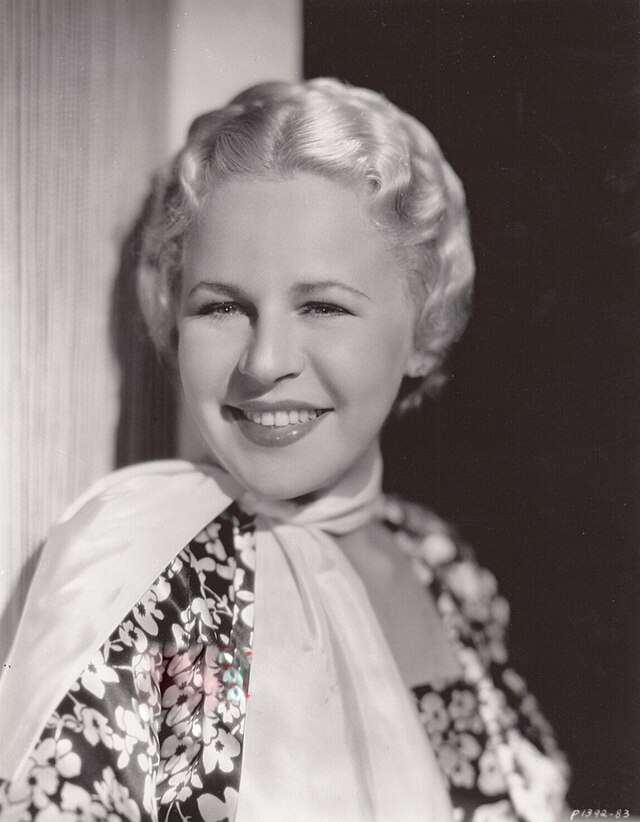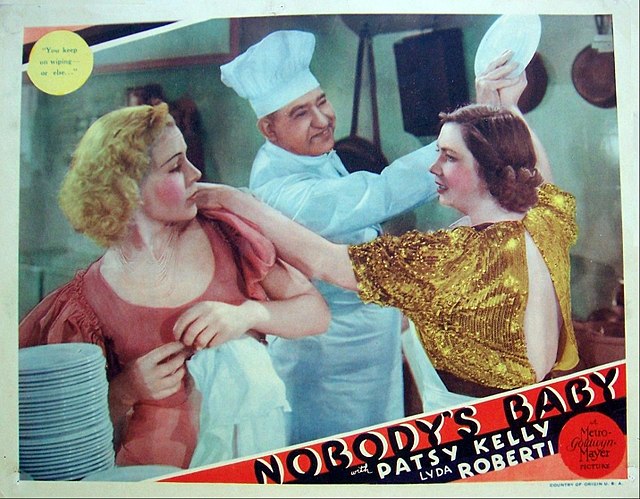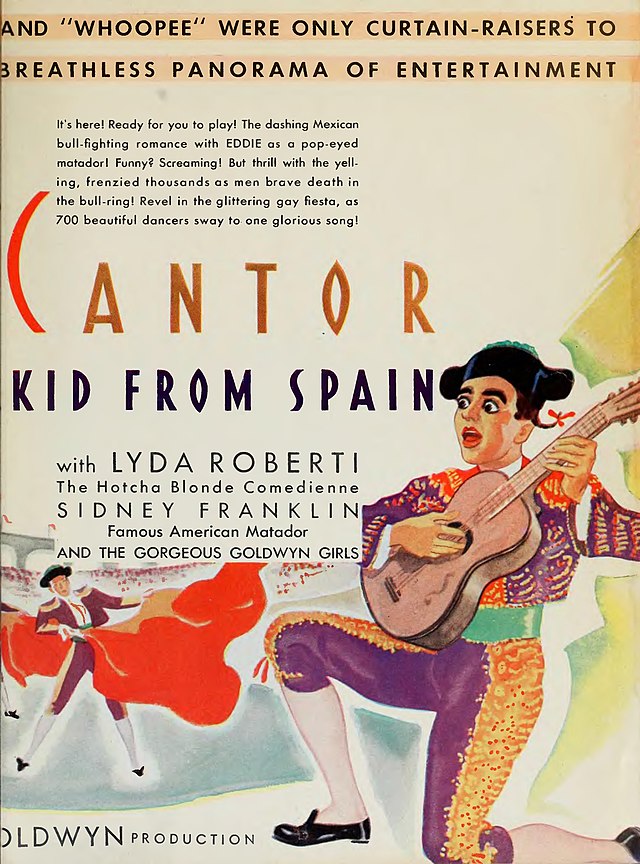Lyda Roberti (1906 – 1938)
Biography and Movie Career
Lyda Roberti, born Lyda Pecjak on May 20, 1906, in Warsaw, Poland, was a vibrant and captivating performer whose life, though tragically short, left an indelible mark on early Hollywood. Her career and personality reflected her unique background and eclectic experiences.
________________________________________
Early Life
Lyda's childhood was anything but ordinary. Born into a family with a father who was a circus performer, she traveled extensively across Europe and Asia during her formative years. This nomadic lifestyle instilled in her a cosmopolitan worldview and an adaptable spirit. The family’s frequent travels eventually led them to Shanghai, China, where Lyda spent much of her youth. During this time, she cultivated her natural flair for performance, inspired by her father’s theatrical endeavors and the rich cultural exposure of their itinerant life.
When her father passed away, Lyda and her mother moved back to Europe. There, she turned to entertainment as a means of supporting herself. Her early performances as a cabaret singer and dancer in Germany and Austria showcased her exuberant personality and undeniable talent, earning her a reputation as a bold and electrifying entertainer.
________________________________________
Path Toward Success
Lyda’s exotic charm, comedic timing, and sultry voice made her an instant standout. She was discovered by American producers who recognized her potential as a star in the rapidly expanding film industry. She immigrated to the United States in the late 1920s and began performing in vaudeville.
Lyda's big break came in the early 1930s when she transitioned to Hollywood. Her vivacious personality, coupled with her heavy Polish accent, made her an ideal fit for comedic roles in the burgeoning genre of screwball comedy. She gained widespread recognition for her performances in films like The Kid from Spain (1932), Million Dollar Legs (1932), and College Rhythm (1934).
Audiences adored her for her playful yet sultry demeanor, which drew comparisons to the iconic Mae West. Lyda’s distinctive comedic style, combined with her vivacity, established her as one of the most intriguing stars of her time.
________________________________________
Personal Life and Passions
In 1935, Lyda married Bud Ernest, an actor and singer who shared her passion for entertainment. Their relationship was warm and supportive, though Lyda’s demanding career often took precedence. While she had no children, Lyda was known for her generosity and affection toward friends and colleagues.
Outside of her professional life, Lyda had a deep love for music and dancing, which she often incorporated into her roles. She was also passionate about animals and was known to care for several pets, viewing them as companions amidst the often isolating life of stardom.
________________________________________
Challenges and Decline
Despite her outwardly bubbly persona, Lyda faced challenges that weighed heavily on her. The high-pressure environment of Hollywood, combined with her rigorous work schedule, took a toll on her health. Lyda struggled with heart problems for much of her life, a condition exacerbated by the intense demands of her career.
________________________________________
Death and Legacy
On March 12, 1938, Lyda Roberti passed away at the age of 31 from a heart attack. Her untimely death shocked the entertainment world and left her fans mourning the loss of a bright and singular talent. She was laid to rest at Forest Lawn Memorial Park in Glendale, California.
Lyda’s legacy lives on as a reminder of the glamour and unpredictability of early Hollywood. Her unique blend of charisma, comedic brilliance, and exotic allure remains celebrated by film enthusiasts and historians alike. Though her career was brief, Lyda Roberti’s impact on the silver screen endures as a testament to her extraordinary spirit and talent.
Video Biography on Lyda Roberti
Exotic Acting Style of Lyda Roberti
Lyda Roberti’s acting style was a unique blend of vivacity, humor, and sultry charm that set her apart in early Hollywood. Her performances were marked by an exuberance that reflected her larger-than-life personality, shaped by her eclectic background and early experiences as a cabaret performer.
________________________________________
Exotic Allure and Playfulness
Lyda’s Polish accent, coupled with her animated expressions and gestures, gave her an exotic and intriguing presence on screen. She often played characters that capitalized on her foreignness, such as glamorous cabaret singers, femme fatales, or flirtatious socialites. However, her performances transcended mere stereotypes, as she infused her roles with warmth and playfulness that made her characters endearing rather than distant.
Her ability to laugh at herself, often poking fun at her own accent or exaggerated mannerisms, gave her performances a self-aware quality that audiences found delightful.
________________________________________
Comedic Timing
Lyda excelled in comedy, particularly in screwball and musical comedies, where her timing was impeccable. She had a knack for delivering lines with just the right mix of innocence and mischief, often stealing scenes from her co-stars. Her expressive face and body language added layers to her humor, making her roles memorable even when she wasn’t the lead.
For example, in Million Dollar Legs (1932), she played Mata Machree, a seductive spy whose over-the-top antics and melodramatic flair brought a chaotic energy to the film. Her exaggerated movements and wide-eyed expressions enhanced the absurdity of her character, elevating the comedy.
________________________________________
Dynamic Physicality
Coming from a cabaret and vaudeville background, Lyda had a dynamic physical presence that was rare among actresses of her era. Whether she was dancing, performing a musical number, or engaging in slapstick humor, she displayed a natural rhythm and agility that made her a joy to watch. Her physical expressiveness complemented her vocal delivery, creating a fully immersive performance style.
________________________________________
Sultry yet Approachable
While Lyda had the sultry looks and magnetism of a classic Hollywood bombshell, her comedic sensibilities and approachable demeanor softened her image. She played women who were glamorous yet grounded, often using her charm to highlight her characters’ humanity. This balance of allure and relatability endeared her to audiences, particularly in films like College Rhythm (1934), where her vivacious singing and comedic antics showcased both her beauty and humor.
________________________________________
Versatility in Supporting Roles
Though she rarely played leading roles, Lyda had the ability to elevate supporting parts into scene-stealing moments. Her characters were often eccentric, bold, and unapologetically themselves, adding texture and energy to the films she appeared in. Despite the limitations of her screen time, she left an indelible impression by fully committing to her roles, no matter their size.
________________________________________
Voice as a Signature Tool
Lyda’s heavily accented English was one of her most distinctive traits. Rather than trying to mask it, she embraced it, using her voice to comedic effect. Her delivery often included a playful mix of exaggerated pronunciations and musical inflections, which added a whimsical quality to her dialogue. Her voice became a hallmark of her screen presence, symbolizing her individuality in a Hollywood often focused on conformity.
________________________________________
Legacy
Lyda Roberti’s acting style was ahead of its time in many ways. She broke away from traditional notions of femininity by combining glamor with humor, exoticism with self-awareness. Her performances exuded joy and spontaneity, qualities that resonated deeply with audiences during the Great Depression, when light-hearted escapism was in high demand. Although her career was brief, her unique approach to comedy and character work left a lasting imprint on Hollywood’s golden era.
Awards and Recognition
Lyda Roberti’s career in Hollywood, though brief, was filled with memorable performances that showcased her comedic talent and captivating presence. However, during her lifetime, she did not receive any major film industry awards, such as Academy Awards or Golden Globes, as these accolades were typically reserved for leading actors or more established performers of the era.
Here’s an overview of how Lyda was recognized during her career:
________________________________________
Critical Acclaim
• Lyda Roberti was widely praised by critics for her comedic timing and ability to light up the screen, particularly in screwball comedies and musicals.
• Her performances in films like Million Dollar Legs (1932) and College Rhythm (1934) received positive reviews for their energy and humor. Critics often highlighted her scene-stealing abilities, even in supporting roles.
________________________________________
Popularity and Public Recognition
• While she may not have received formal awards, Lyda earned significant public recognition as a beloved comedic actress during the 1930s. Her unique style and accent made her a standout figure in Hollywood, and she garnered a devoted fanbase.
• She was frequently featured in fan magazines of the era, where her charm, exotic background, and humor were celebrated. These publications often referred to her as a "scene-stealer" or a "delightful comedienne."
________________________________________
Legacy and Retrospective Recognition
• After her untimely death in 1938, Lyda Roberti's work continued to be appreciated by film historians and enthusiasts of early Hollywood comedies.
• Her role in Million Dollar Legs (1932) remains a cult favorite, and the film itself is often cited as an example of early screwball comedy.
• In modern retrospectives, Lyda is recognized as one of the era’s great comedic talents, with a unique style that set her apart from her contemporaries.
What Others said about Lyda Roberti
Peers and Co-Workers
• W.C. Fields, with whom she shared the screen in Six of a Kind (1934), reportedly admired her comedic timing and vibrant personality. He once remarked about her ability to bring energy to a scene, even in the presence of larger-than-life figures like himself.
• Directors and producers often praised Lyda’s willingness to embrace her distinct accent and mannerisms, which brought authenticity and humor to her roles. They admired her professionalism and adaptability despite the language challenges she faced in delivering dialogue.
________________________________________
Critics
• Contemporary critics celebrated Lyda for her "vivacious charm" and "scene-stealing" comedic abilities. Her exotic accent and animated performances were often described as “delightfully eccentric,” adding a spark to every film she appeared in.
• Reviews for films like Million Dollar Legs (1932) frequently noted her ability to stand out in ensemble casts, with one critic writing, "Lyda Roberti has a way of making chaos look charming."
• Film historian Richard Barrios later described her as "a brilliant comedienne who could take a few lines and turn them into gold," highlighting her contribution to the screwball comedy genre.
________________________________________
Fan Sentiments
• Lyda was adored by fans for her playful and glamorous screen presence. Her accent, a blend of Polish and German inflections, made her stand out, and fans found her both intriguing and endearing.
• She was often mentioned in fan magazines of the time as a fresh and exciting talent, with readers lauding her ability to bring joy and humor during the hardships of the Great Depression.
________________________________________
Posthumous Recognition
• In retrospectives, Lyda is often celebrated as a pioneer of comedic roles for women, bringing a blend of sensuality and humor that was uncommon for the era. Film scholars and critics regard her as a performer who was ahead of her time, blending exotic allure with relatable humor.
• A modern analysis of her work in Million Dollar Legs describes her as “the beating heart of the absurdist comedy,” with her exaggerated gestures and sultry charm grounding the film’s otherwise chaotic plot.
________________________________________
Anecdotes
• Those who knew her personally often spoke of her warmth and generosity. Despite her exotic on-screen persona, Lyda was described as down-to-earth and approachable, with a genuine love for entertaining others.
• Her husband, Bud Ernest, remembered her as a devoted partner with an infectious sense of humor and a lively spirit that brought joy to everyone around her.
Movies from Lyda Roberti
1931
• “The Road to Reno”
Lyda played a supporting role in this romantic comedy about marital misunderstandings and divorces set in Reno, Nevada, known as the divorce capital of the time.
________________________________________
1932
• “Million Dollar Legs”
A surreal comedy about a fictional country, Klopstokia, attempting to win the Olympics to solve its financial woes. Lyda played Mata Machree, a femme fatale spy whose seductive antics add hilarity to the plot.
• “The Kid from Spain”
A musical comedy starring Eddie Cantor. Lyda portrayed a flirtatious señorita who entangles the protagonist in humorous situations involving mistaken identities and bullfights.
________________________________________
1933
• “The Phantom Broadcast”
A mystery about a radio singer whose murder uncovers secrets and betrayals. Lyda had a supporting role as a nightclub singer.
• “Torch Singer”
A dramatic tale of a woman who becomes a torch singer to support her child after being abandoned. Lyda appeared in a supporting role.
• “Her Majesty, Love”
A comedy-romance featuring Fredric March. Lyda played a lively cabaret performer adding European charm and humor to the film’s nightclub scenes.
________________________________________
1934
• “Six of a Kind”
A madcap road trip comedy starring W.C. Fields and George Burns. Lyda portrayed a cheerful and ditzy hotel receptionist.
• “The Merry Widow”
A musical romance set in a fictional European kingdom. Lyda had a small but memorable role as a lively dancer in the glamorous ball sequences.
• “College Rhythm”
A musical comedy revolving around a college sports rivalry and romantic entanglements. Lyda stole scenes as the vivacious and comedic cabaret singer.
________________________________________
1935
• “The Big Broadcast of 1936”
A musical-comedy variety show film, blending humor and musical performances. Lyda played a charismatic performer who lights up the screen with her comedic and vocal talents.
• “Man on the Flying Trapeze”
Starring W.C. Fields, this comedy follows the misadventures of a henpecked husband. Lyda appeared in a minor role as a neighbor.
________________________________________
1936
• “Colleen”
A musical comedy about business, romance, and ambition. Lyda played a comedic foil as the wife of a wealthy character, showcasing her knack for humor.
________________________________________
1937
• “Pick a Star”
A musical comedy about a small-town girl’s journey to Hollywood stardom. Lyda provided comedic relief as a flamboyant foreign actress.
• “On the Avenue”
A romantic musical about a Broadway producer who falls in love with a socialite. Lyda appeared in a minor role, adding her trademark flair.



